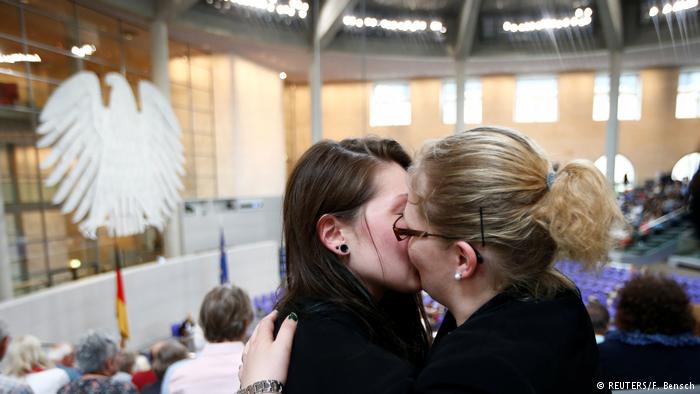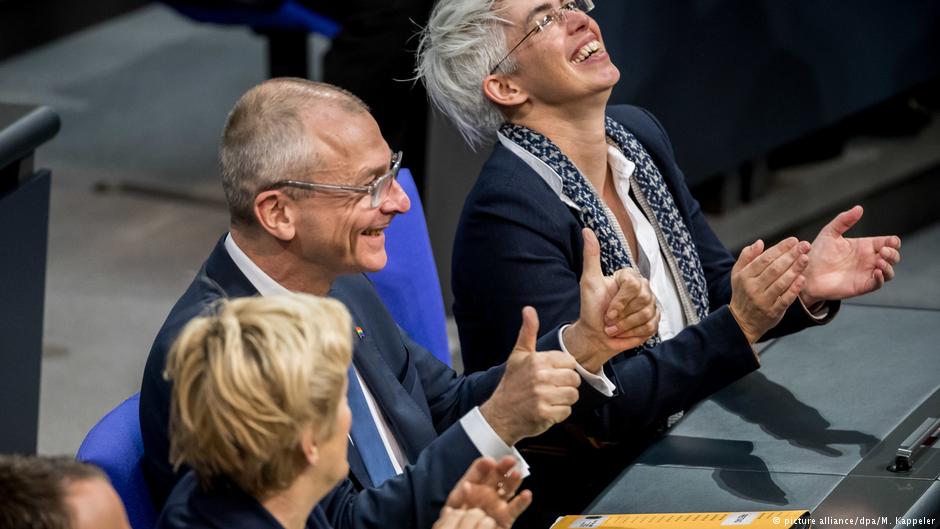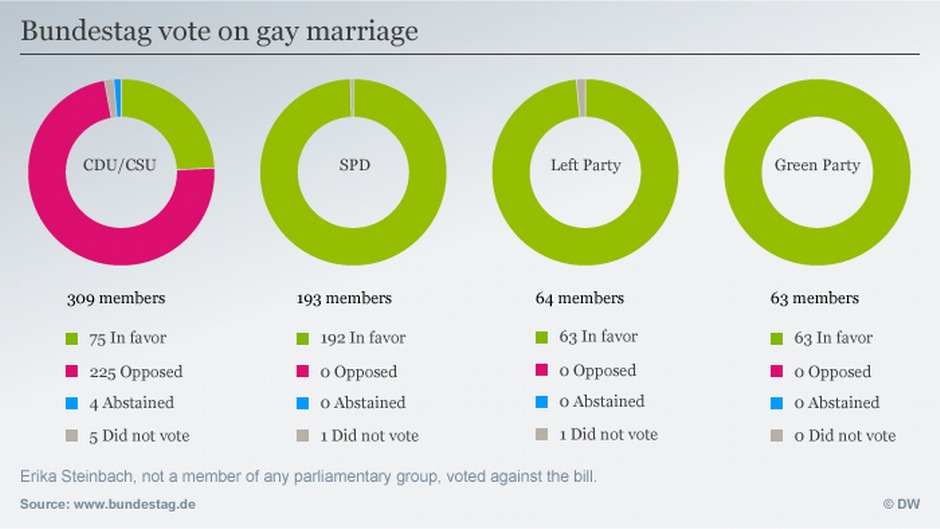Homosexual couples in Germany will now be able to marry and adopt children under a new law passed by parliament. The move brings Germany into line with several other European countries.

PARLIAMENTARIANS REACT TO 'HISTORIC' VOTE IN FAVOR OF GAY MARRIAGE
'Yes' vote prompts kisses in the public gallery
Moments after parliament endorsed 'marriage for all,' with 393 in favor, 226 against and four abstentions, same-sex couples in the chamber's public gallery openly kissed and hugged one another. Those voting in favor included 75 members of Chancellor Angela Merkel's conservative CDU-CSU bloc. For. źródło: dw.de
The German parliament, or Bundestag, on Friday passed a bill legalizing same-sex marriages in a snap vote that made it onto the agenda before the summer break after a surprise shift by Chancellor Angela Merkel.
The bill passed by 393 to 226, with four abstentions. Merkel herself voted against the bill, although her comments helped bring it about.

Openly gay Green politician Volker Beck celebrated a success on his last day in parliament. Fot. Źródło: dw.de
However, more than 70 members of Merkel's conservative bloc must have voted in favor of the bill for it to pass.
Merkel later explained her "no" vote by saying that she understood the definition of marriage in the German constitution as referring solely to unions between men and women. She said, however, that she hoped the vote to approve gay marriage would lead to "more social peace."
Although she voted against homosexual marriage, she said that after long reflection, she had come to the conclusion that same-sex couples should be able to adopt children, which is something the new bill will legalize.
The German Parliament approved same-sex marriage. Congratulations to all gay couples who have been waiting to get married! #Lovewins 🏳️🌈👬👫👭 pic.twitter.com/naRnJYFfxC
— GermanForeignOffice (@GermanyDiplo) 30 czerwca 2017
Volker Beck of the Green party, who has long advocated legalizing same-sex marriage, called the vote "a success for democracy," citing opinion polls showing that 80 percent of Germans were in favor of allowing homosexual couples to marry and adopt children.
Ahead of the vote, Gerda Hasselfeldt from the CSU, which has vehemently opposed the measure, said heterosexual marriage that could produce children was the basis of society, adding that she could not understand "how people could simply put aside something that went to constitute our state."
Germany's approval of homosexual marriages adds it to the growing list of Western countries that allow such unions. Fourteen European countries have now made gay marriage legal, with the Netherlands leading the way in 2001.
Campaign ploy?
The way was paved for a vote on Monday night when Merkel said she wanted the issue to become one of "conscience," suggesting that she would allow a free vote among her own divided party. Her Social Democrat rival for the role of chancellor, Martin Schulz, pounced on Merkel's comments the next day, advocating an immediate vote in parliament, before September's elections.
The bill was put on the agenda for the last day before the summer break by the center-left Social Democrats (SPD), the Greens and the Left party. Merkel's CDU/CSU bloc had criticized the SPD's move, saying that they had previously agreed not to hold a parliamentary vote on the issue during their coalition.
Schulz was quick to hail the outcome of the vote, saying that marriage for all meant "unity, justice and freedom" for all Germans who love each other, quoting from the German national anthem.
Die Ehe für alle ist beschlossen. Damit gibt es Einigkeit und Recht und Freiheit in Deutschland jetzt für alle, die sich lieben.
— Martin Schulz (@MartinSchulz) 30 czerwca 2017
Schulz's SPD ally, Justice Minister Heiko Maas, celebrated the decision more playfully on Twitter, mimicking Chancellor Merkel's signature hand gesture:
Die #Ehefüralle wird Gesetz. Endlich gleiches Recht für gleiche Liebe. #pride #lovewins #CSD pic.twitter.com/dhap8Ab549
— Heiko Maas (@HeikoMaas) 30 czerwca 2017
Responses poured in around the country. Bundesliga football club Hertha Berlin set a clear signal in the capital, hoisting a rainbow flag and posting video footage of the event.
Hertha BSC zeigt Flagge! 🏳️🌈 #ehefuerralle #prideweekend #hahohe pic.twitter.com/S2dQbElLnP
— Hertha BSC (@HerthaBSC) 30 czerwca 2017
Germany currently allows civil partnerships, but not full marital rights, which would include the possibility to jointly adopt children.
Out-foxed or pragmatic?
Schulz had forced the speedy vote, saying he would "take the chancellor at her word."
However, while some would consider the chancellor and CDU to have been wrong-footed, an alternative theory - that Merkel wanted to remove same-sex marriage as an election issue - has been floated. After all, Monday's comments did appear to be her laying foundations for a vote on the same issue in the next legislative period.
All three potential partners in government with the CDU - the Social Democrats (SPD), Greens and pro-business Free Demo
Deutche Welle / Redakcja polska ![]()



